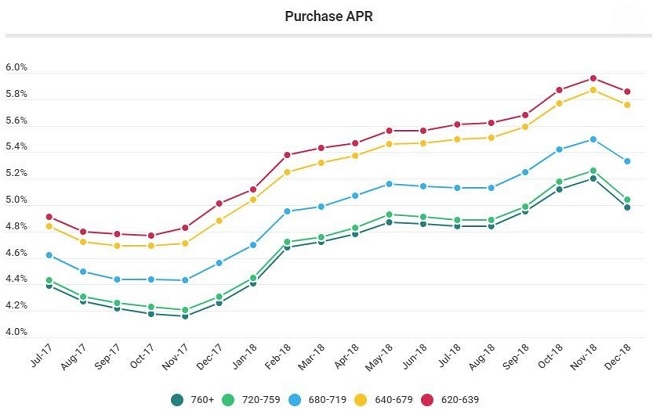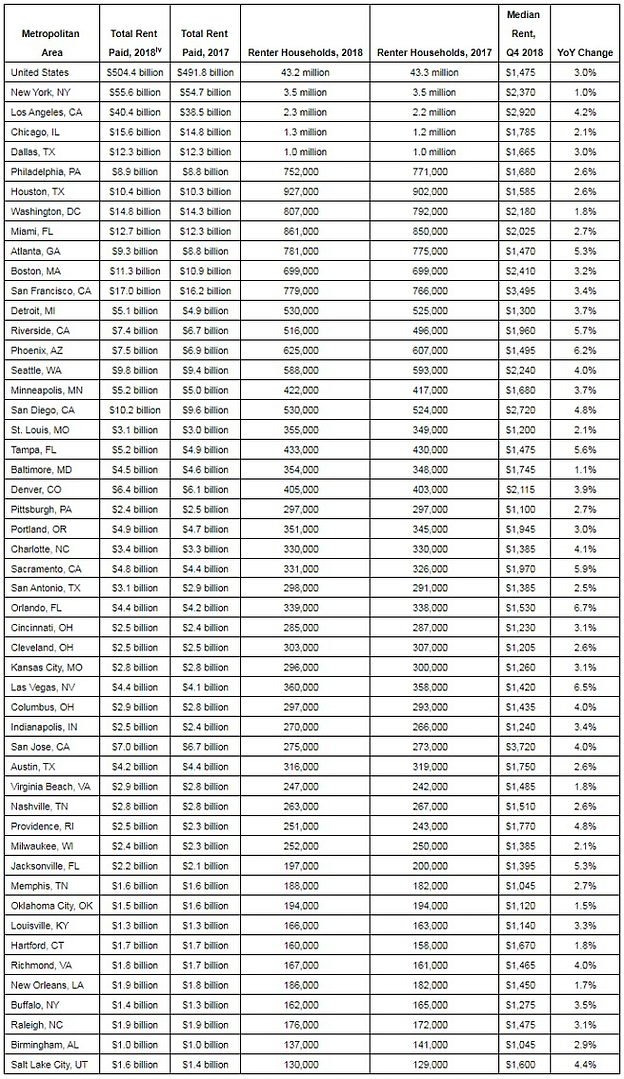– Renters spent more on housing than ever before in 2018, even with fewer renter households
– Renters paid $12.6 billion more in rent this year than they did in 2017 – which is about a 2.6 percent increase.
– There are about 43.2 million households renting in the United States, a slight decline from 2017.
– More than 10 percent ($55.6 billion) of all rent collected in the United States came from renters living in the New York City metro area.
– Rents are currently rising the fastest in Orlando and Las Vegas, and renters in each of those cities spent about $4.4 billion on rent this year.
SAN FRANCISCO, Dec. 21, 2018 (PRNewswire) U.S. households spent a record amount on rent in 2018 despite a decrease in the number of households who rent their home, according to a new HotPads® analysis. Overall, the U.S. spent $504.4 billion on rent in 2018 – more than the entire GDP of Belgium ($494.7 billion)(i) and three times the current net worth of Amazon CEO Jeff Bezos ($124 billion)(ii).
Renters spent $12.6 billion more paying their rent in 2018 than they did in 2017. The current median rent is $1,475, up 3 percent from a year ago. Throughout 2018, rents rose about 3 percent year over year – continuing a gradual slowdown in rent appreciation that began in mid-2016.
However, the number of renter households in the U.S. decreased slightly in 2018. There were about 43.2 million renter households across the country this year – nearly 100,000 fewer than in 2017.
A gradual slowdown in rent appreciation has allowed renters looking to purchase homes greater ability to save for a down payment in recent years, and millennials – the generation comprising half of today’s renters — are also buying homes more than any other generation(iii). With more eligible buyers on the market, the number of renter households has decreased slightly over the past year.
“After several years of a booming economy, more millennials became financially able to become home owners in 2018,” said Joshua Clark, economist at HotPads. “However, rent affordability continues to be a challenge, as those who still rent are paying even higher prices now than they were a year ago. If interest rates continue rising in 2019, more would-be homebuyers may decide to continue renting, which could put additional pressure on rent prices. Fortunately for renters, the housing market is also cooling nationwide, signaling that the entire market may be leveling off and making it easier for renters to keep up with housing expenses.”
Of the 50 largest metro areas in the U.S., renters in the New York City metro area spent the most on rent this year – a total of $55.6 billion. However, rent growth in the New York metro also slowed in 2018. Rents in the New York City metro area are rising just 1 percent annually now, compared to 1.8 percent annually at this time last year.
While rent appreciation has been steady or slowed in many metro areas, some markets in the Southeast and Southwest are still seeing significant price gains. Rents are appreciating the fastest in Orlando, Las Vegas and Phoenix, at a rate more than twice as fast as the national median. Renters in Orlando and Las Vegas spent about $4.4 billion on rent in 2018, while renters in Phoenix spent about $7.5 billion.
HotPads is a Zillow® Group-owned apartment and home search platform for renters in urban areas across the United States. For more information on the U.S. rental market, visit HotPads.com.

HotPads is an efficient rental search platform for urban areas across the United States, with features designed for competitive markets such as map-based search, real-time notifications and detailed information on landlords and property managers that help renters spend less time searching and more time feeling excited about their next home.
Launched in 2005, HotPads is based in San Francisco and is owned and operated by Zillow Group, Inc. (NASDAQ: Z and ZG).
HotPads is a registered trademark of Zillow, Inc.
(i) U.S. Bureau of Economic Analysis, 2017
(ii) As of December 20, 2018. https://www.bloomberg.com/billionaires/profiles/jeffrey-p-bezos/
(iii) Millennials are the largest single group of home renters (50 percent) and home buyers (42 percent), according to the 2018 Zillow Group Report on Consumer Housing Trends.
(iv) Projected through the end of 2018
Like this:
Like Loading...






